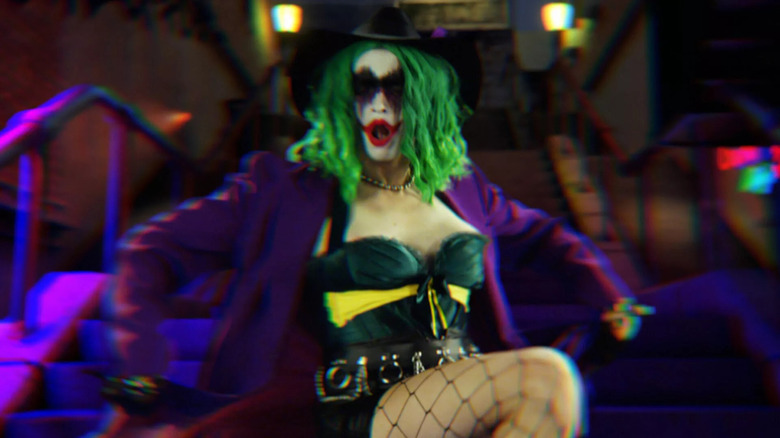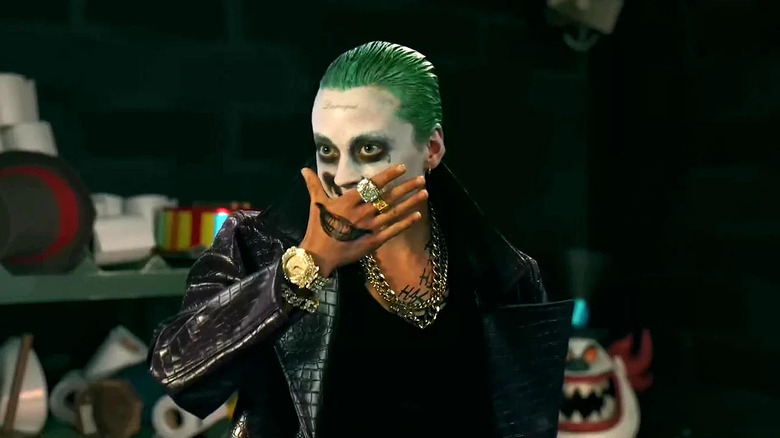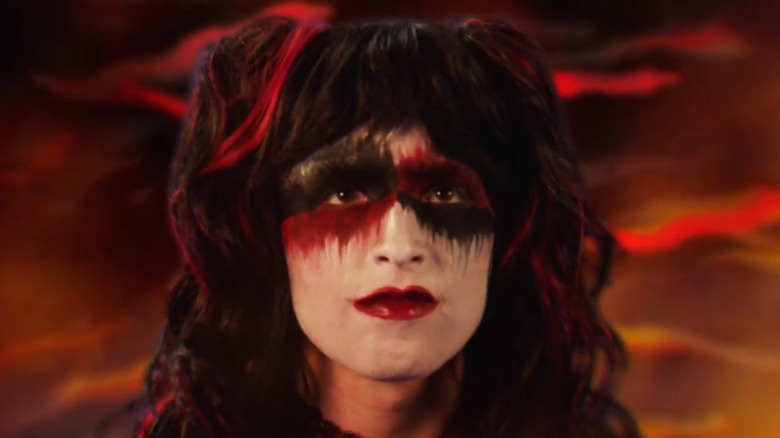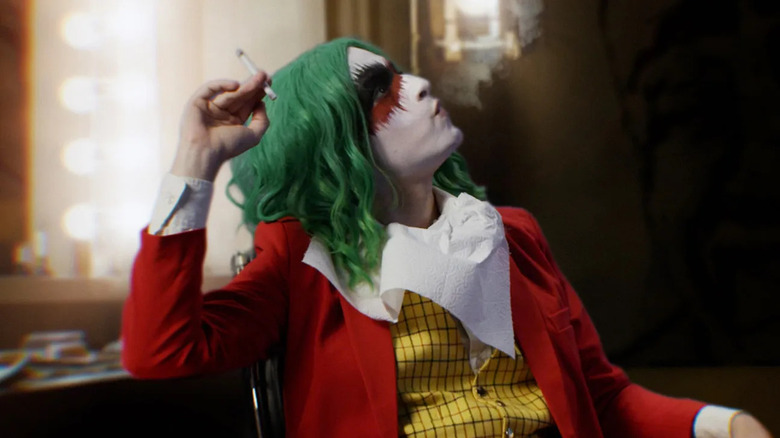The People's Joker Review: A Bafflingly Brilliant Slice Of Satirical Anarchy
If you're just waking up to the saga of "The People's Joker," it starts out the way most comic book characters do — with a tragic origin story. After working as an editor for shows like "On Camera," "Comedy Bang! Bang!," and earning a Primetime Emmy Award nomination for "Who is America?," Vera Drew successfully crowdfunded her fair use feature directorial debut, in which she utilizes the iconography of arguably one the most recognizable DC Comics world — Batman and the Joker — to tell a queer, autobiographical coming-of-age Joker origin story that doubles as a massive middle finger to Lorne Michaels and the conventional, corporate comedy landscape. "The People's Joker" enjoyed a single screening at the 2022 Toronto International Film Festival before it was pulled due to "rights issues."
Fortunately, Drew refused to go down without a fight, and after proving the film is protected under parody law, the LGBTQIA+-focused distribution company Altered Innocence heard the call and freed "The People's Joker." Ironically, the threat to silence "The People's Joker" has only made the conspicuous takedowns of comedy culture, superhero obsessives, anti-trans bigots, and the corporate destruction of art even stronger.
Co-written with Bri LeRose, the result is a deeply personal and delightfully absurd attack of visual potpourri, where Drew stars as herself as Joker the Harlequin, an aspiring transgender comedian who moves to Gotham City, a dystopian concrete jungle where comedy is ruled by the government-sanctioned United Clown Bureau (which stands in for "Saturday Night Live" and the improv education institution the Upright Citizens Brigade where many "SNL" greats get their start), and rebellious folks who don't fit into the UCB's style of comedy are pushed into the underground anti-comedy community ... and wait'll they get a load of Vera Drew.
A girl can't live by psychoses alone
Vera Drew's love of all things Batman is palpable, and her bold use of the instantly recognizable characters, the archetypes they represent, and the trope-riddled storylines as a way to process her own trauma, identity, and foundational relationships is inspiring. Anyone who loves entertainment has likely had a similar moment — where a depiction on screen was the first time you "felt seen" in a world that often makes us all feel invisible, or when cinema provided the language for thoughts and feelings we couldn't make sense of ourselves.
Drew narrates or addresses the camera directly throughout the film, taking the audience on a journey from her small-town upbringing with an overbearing mother (Lynn Downey) who internalizes her child's emotional turmoil as a personal affront to her own parenting, villainizing a young [DEADNAME CENSOR BLEEP] for the crime of not being an unconditionally happy child. Her punishment is a prescription for Smylex, an inhalant that forces an unnatural smile and erases any semblance of negative emotions. It's a quick fix to appease her mother and the unforgiving world around her, but as any Batman fan can tell you — Smylex is also a poison that will slowly deteriorate you from the inside out.
When she finally makes it to Gotham, she realizes the comedy world is separated between "jokemen" and "harlequins," a binary where she doesn't quite fit. She takes up the moniker "Joker the Harlequin" and falls in with a gaggle of alternative comedians like the Penguin (Nathan Faustyn) and Jason "Mr. J" Todd (Kane Distler), an emotionally abusive transman (resembling Jared Leto's Joker in "Suicide Squad") with the plan to take down Batman and the UCB for good. Joker the Harlequin quickly falls for Mr. J, ignoring the onslaught of red flags he brings to the table in favor of someone finally accepting her.
Not every girl makes a superhero's night table
Drew's aesthetic approach to "The People's Joker" will certainly be polarizing. The live-action actors are green-screened into digital backgrounds, there are multiple animation styles sprinkled throughout, some characters are crudely CGI'd alongside live-action actors without any acknowledgment of the differing appearances, and Drew's editing style is visually assaulting — but the kind you'd pay someone to let you submit to and thank them afterward for the pleasure.
This is a trippy flick that echoes the DIY-or-die mentality of truly great subversive comedy, and anything I could critique as "choppy" or "jarring" only further emphasizes the core tenant of "The People's Joker"; that art as an extension of self-expression is limitless and rejecting a person's creativity unless it's sanitized into an easily digestible package for mass-produced is a fundamental betrayal. Yes, this is a transgender story. Yes, this is an anarchic satire of the superhero industrial complex. But above all else, "The People's Joker" is a rallying cry for artists staring down the barrel of executives and algorithms constantly telling us what art can and cannot be, with alt-comedy legends like Bob Odenkirk, Scott Aukerman, and Tim Heidecker lending their talents as co-signatures to Drew's work.
Multiple generations of people have looked toward the world of entertainment as a tool to make sense of their own identity, but how can that happen when the people in charge (in this case, a grotesquely fleshy digital Lorne Michaels voiced by Maria Bamford) are limiting the stories that can be told and the people who get to tell them? What does it mean when you watch Joel Schumacher's "Batman Forever" as a little boy and want to be Nicole Kidman instead of the Caped Crusader, and when your only avenue to knowing trans people exist is by seeing dead bodies on true crime procedurals or as shocking reveals on daytime talk shows? "I used to think my life was a tragedy, but now I realize it's a comedy," said Joaquin Phoenix's Academy Award-winning take on the character. "The People's Joker" is bold enough to actually lean in.
A world where normal rules of right and wrong no longer apply
On paper, "The People's Joker" shouldn't exist, but from a genuine visionary like Vera Drew who lives every day in our real society with real people (many of whom are in positions of legislative power and influence) who believe she shouldn't exist either, this work is going to persevere and find her people regardless ... and there's nothing any of us can do to stop it. She's not a monster, she's just ahead of the curve, and the more "The People's Joker" goes on, the more it's undeniable that Drew is operating on a creative level even the most gifted auteurs could only dream of. Make no mistake, there are going to be plenty of people who are downright repelled by this film for its overtly trans subject matter, skewering of a comedic institution, intentionally low-budget visuals, or unflinching satire of all things Batman — but those naysayers would be wise to heed the advice of dr. Chase Meridian ... maybe you just haven't met the right woman.
Heath Ledger's Joker famously claimed "I believe that whatever doesn't kill you simply makes you stranger," and Drew has grabbed onto this mantra with both hands, digging in her fingernails until she breaks skin. She doesn't just intertwine layers of comic book lore into the lore of her own existence, she violently smashes them together like a frustrated toddler after being asked to shuffle the deck after losing the third game of Uno in a row. It's the cinematic equivalent of recreationally thrusting yourself into a K-hole after wading through the discourse from a bunch of whiny, petulant pissbabies about why superhero movies are all "too woke" these days, despite the studios' continuing to cater to the status quo to the detriment of storytelling.
Despite its roots in an onslaught of pop culture references. watching her navigate through it all delivers one of the most wholly unique films of the year. Vera Drew is both the unstoppable force and the immovable object, and we should all be so lucky to bear witness to her madness. The only sensible way to live in this world is without rules, and "The People's Joker" refuses to follow any of them.
/Film Rating: 8.5 out of 10



